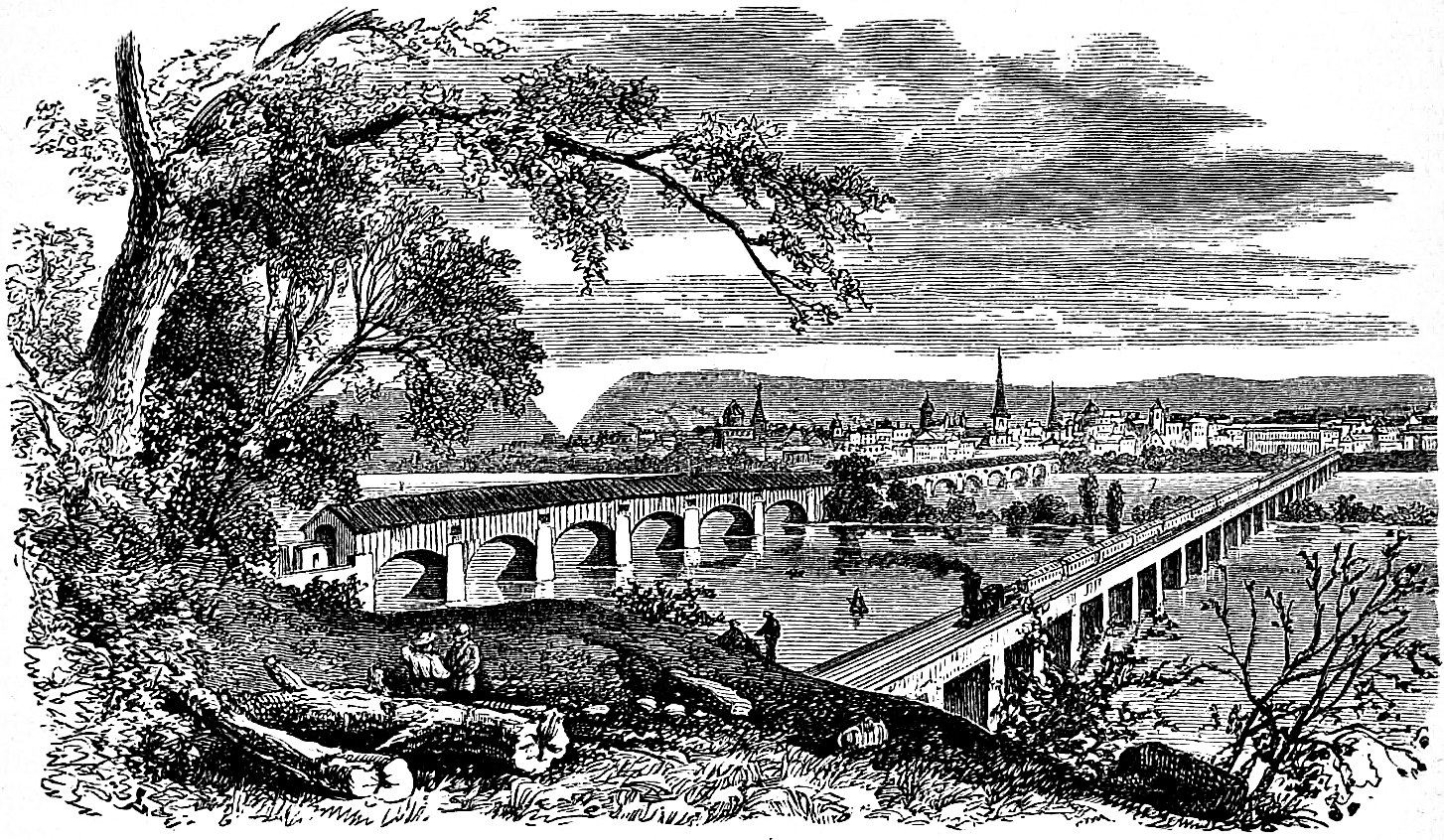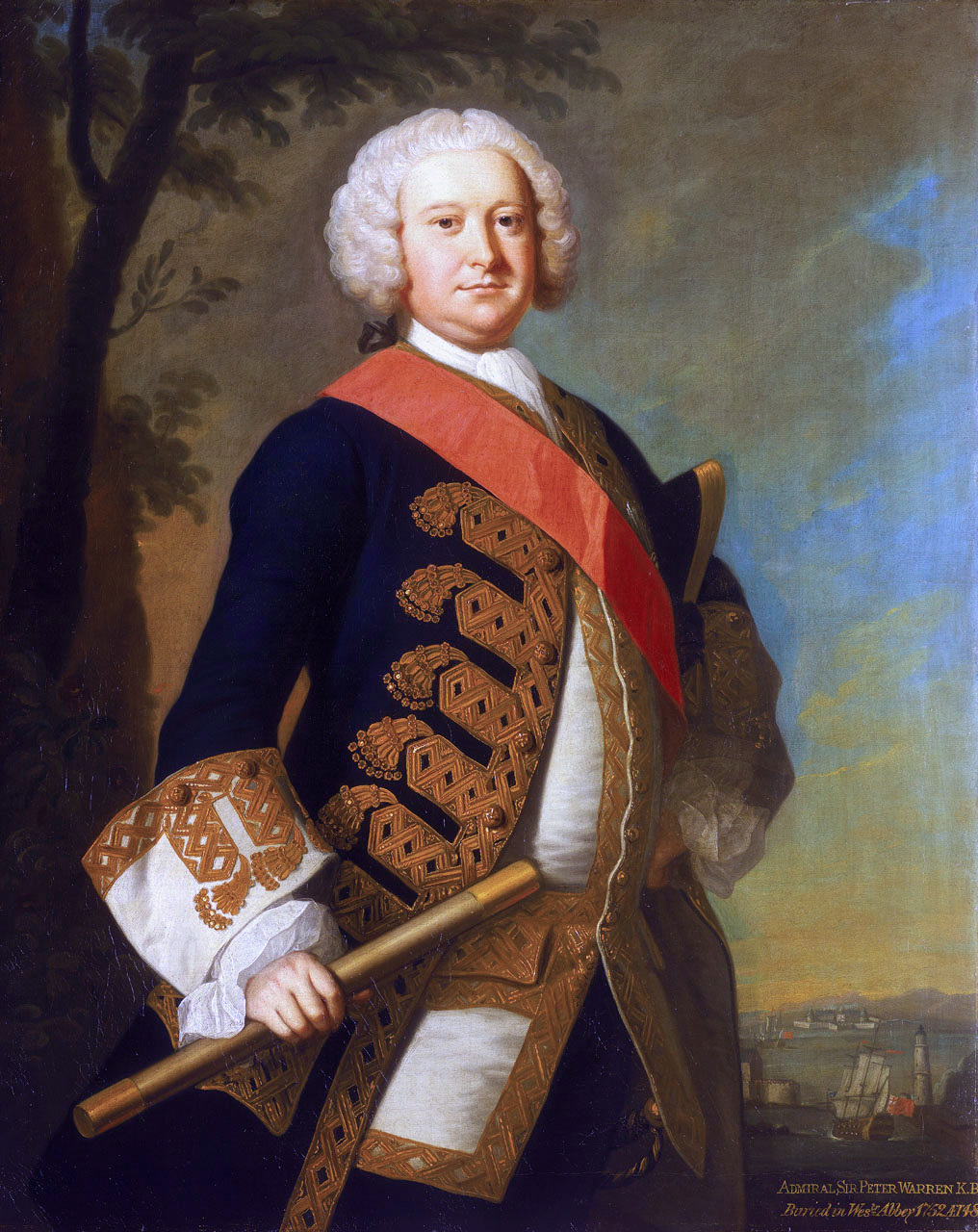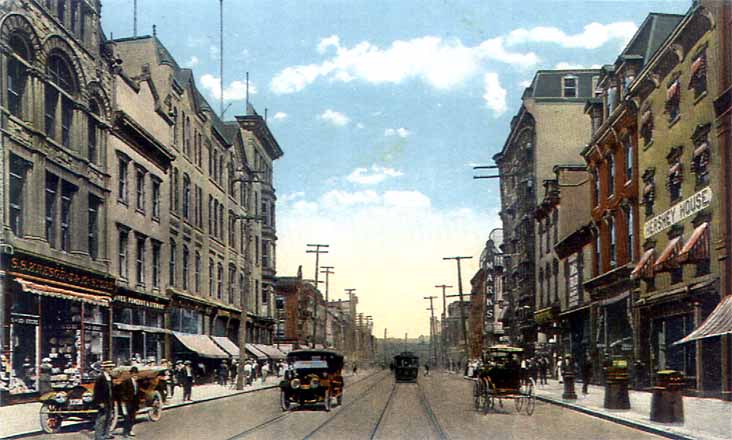|
John Harris Jr. (settler)
John Harris Jr. (1716 – July 29, 1791 in Harrisburg, Pennsylvania), was a storekeeper and frontiersman who operated a ferry along the Susquehanna River at Harrisburg. Harris was the son of John Harris Sr., who is considered the first settler to establish a trading post along the Susquehanna River at what would later become the state capital of Pennsylvania. Biography John Harris Jr. was born in Harrisburg in 1716, and after his father's death in 1748 Harris continued to operate his father's trading business and ferry operation. For many years, Harris and his family were considered the principal store keepers on the United States, American frontier; and at his house two notable "council fires" were held with the Indians of the Iroquois, Six Nations and other tribes. At the first, June 8, 1756, Governor Robert Hunter Morris, Morris, with his council, was present; and at the second, April 1, 1757, the deputy of Sir William Johnson, his majesty's deputy of the affairs of the ... [...More Info...] [...Related Items...] OR: [Wikipedia] [Google] [Baidu] |
Appletons' Harris John House
Appleton's or Appletons may refer to several publications published by D. Appleton & Company, New York, including: *''Appletons' Journal'' (1869–1881) *''Appletons' Cyclopædia of American Biography'' (1887–1889) *''Appleton's Magazine'' (1905–1909) *Appletons' travel guides See also *Appleton (surname) {{Media set index ... [...More Info...] [...Related Items...] OR: [Wikipedia] [Google] [Baidu] |
James Hamilton (Pennsylvania)
James Hamilton (1710 – 14 August 1783), son of the well-known American lawyer Andrew Hamilton, was a prominent lawyer and governmental figure in colonial Philadelphia and Pennsylvania. He served as Deputy Governor of the Province from 1748 to 1754, and again from 1759 to 1763.Armor, William C., ''Lives of the Governors of Pennsylvania, With the Incidental History of the State, from 1609 to 1872'', Philadelphia, J.K. Simon (1873) Life James Hamilton was born in Philadelphia in 1710. He was educated in Philadelphia and England before becoming a practicing lawyer in 1731. On 28 December 1733, his father resigned as prothonotary of the Supreme Court of Pennsylvania, Hamilton was appointed to the office. In May 1734 James's father Andrew Hamilton sold him the town site of Lancaster, Pennsylvania for 5 shillings. Later that month, on 21 May, the younger Hamilton secured a patent from the Penn family for his grant on the Lancaster land. After the death of his father on 4 Augus ... [...More Info...] [...Related Items...] OR: [Wikipedia] [Google] [Baidu] |
People From Harrisburg, Pennsylvania
A person ( : people) is a being that has certain capacities or attributes such as reason, morality, consciousness or self-consciousness, and being a part of a culturally established form of social relations such as kinship, ownership of property, or legal responsibility. The defining features of personhood and, consequently, what makes a person count as a person, differ widely among cultures and contexts. In addition to the question of personhood, of what makes a being count as a person to begin with, there are further questions about personal identity and self: both about what makes any particular person that particular person instead of another, and about what makes a person at one time the same person as they were or will be at another time despite any intervening changes. The plural form "people" is often used to refer to an entire nation or ethnic group (as in "a people"), and this was the original meaning of the word; it subsequently acquired its use as a plural form of per ... [...More Info...] [...Related Items...] OR: [Wikipedia] [Google] [Baidu] |
1791 Deaths
Events January–March * January 1 – Austrian composer Joseph Haydn arrives in England, to perform a series of concerts. * January 2 – Northwest Indian War: Big Bottom Massacre – The war begins in the Ohio Country, with this massacre. * January 12 – Holy Roman troops reenter Liège, heralding the end of the Liège Revolution, and the restoration of its Prince-Bishops. * January 25 – The British Parliament passes the Constitutional Act 1791, splitting the old province of Quebec into Upper and Lower Canada. * February 8 – The Bank of the United States, based in Philadelphia, is incorporated by the federal government with a 20-year charter and started with $10,000,000 capital.''Harper's Encyclopaedia of United States History from 458 A. D. to 1909'', ed. by Benson John Lossing and, Woodrow Wilson (Harper & Brothers, 1910) p169 * February 21 – The United States opens diplomatic relations with Portugal. * March 2 – ... [...More Info...] [...Related Items...] OR: [Wikipedia] [Google] [Baidu] |
1716 Births
Events January–March * January 16 – The application of the Nueva Planta decrees to Catalonia make it subject to the laws of the Crown of Castile, and abolishes the Principality of Catalonia as a political entity, concluding the unification of Spain under Philip V. * January 27 – The Tugaloo massacre changes the course of the Yamasee War, allying the Cherokee nation with the British province of South Carolina against the Creek Indian nation. * January 28 – The town of Crieff, Scotland, is burned to the ground by Jacobites returning from the Battle of Sheriffmuir. * February 3 – The 1716 Algiers earthquake sequence began with an 7.0 mainshock that caused severe damage and killed 20,000 in Algeria. * February 10 – James Edward Stuart flees from Scotland to France with a handful of supporters, following the failure of the Jacobite rising of 1715. * February 24 – Jacobite leaders James Radclyffe, 3rd Earl of Derwentwater and W ... [...More Info...] [...Related Items...] OR: [Wikipedia] [Google] [Baidu] |
History Of Harrisburg, Pennsylvania
The history of Harrisburg, the state capital of the Commonwealth of Pennsylvania, United States, has played a key role in the development of the nation's industrial history from its origins as a trading outpost to the present. Harrisburg has played a critical role in American history during the Westward Migration, the American Civil War, and the Industrial Revolution. For part of the 19th century, the building of the Pennsylvania Canal and later the Pennsylvania Railroad allowed Harrisburg to become one of the most industrialized cities in the Northeast. Early settlement The site along the Susquehanna River in which Harrisburg is located is thought to have been inhabited by Native Americans as early as 3000 BC. Known to the Native Americans as "Peixtin," or "Paxtang," the area was an important resting place and crossroads for Native American traders, as the trails leading from the Delaware to the Ohio and from the Potomac to the Upper Susquehanna intersected there. The first Eur ... [...More Info...] [...Related Items...] OR: [Wikipedia] [Google] [Baidu] |
National Historic Landmark
A National Historic Landmark (NHL) is a building, district, object, site, or structure that is officially recognized by the United States government for its outstanding historical significance. Only some 2,500 (~3%) of over 90,000 places listed on the country's National Register of Historic Places are recognized as National Historic Landmarks. A National Historic Landmark District may include contributing properties that are buildings, structures, sites or objects, and it may include non-contributing properties. Contributing properties may or may not also be separately listed. Creation of the program Prior to 1935, efforts to preserve cultural heritage of national importance were made by piecemeal efforts of the United States Congress. In 1935, Congress passed the Historic Sites Act, which authorized the Interior Secretary authority to formally record and organize historic properties, and to designate properties as having "national historical significance", and gave the Nation ... [...More Info...] [...Related Items...] OR: [Wikipedia] [Google] [Baidu] |
Downtown Harrisburg
Downtown Harrisburg is the central core neighborhood, business and government center which surrounds the focal point of Market Square, and serves as the regional center for the greater metropolitan area of Harrisburg, Pennsylvania, United States. Harrisburg's downtown Center City comprises the original borough laid out in a grid pattern by John Harris in 1785. East–west streets are named and north–south streets are numbered. Market Street, running east–west, is the dividing point between north and south street designations. Harrisburg's Central Business District includes the Pennsylvania State Capitol Complex and other state government offices, the Dauphin County Courthouse and other county government offices, City of Harrisburg offices, Pennsylvania State Museum, federal government offices, and other, non-government related commercial retail and office development. Some residential development, both in apartment high-rises and in the upper floors of mixed commercial/resid ... [...More Info...] [...Related Items...] OR: [Wikipedia] [Google] [Baidu] |
Sir William Johnson
Sir William Johnson, 1st Baronet of New York ( – 11 July 1774), was a British Army officer and colonial administrator from Ireland. As a young man, Johnson moved to the Province of New York to manage an estate purchased by his uncle, Royal Navy officer Peter Warren, which was located in territory of the Mohawk, one of the Six Nations of the Iroquois League, or ''Haudenosaunee''. Johnson learned the Mohawk language and Iroquois customs, and was appointed the British agent to the Iroquois. Because of his success, he was appointed in 1756 as British Superintendent of Indian Affairs for all the northern colonies. Throughout his career as a British official among the Iroquois, Johnson combined personal business with official diplomacy, acquiring tens of thousands of acres of Native land and becoming very wealthy. Johnson commanded Iroquois and colonial militia forces against the French and their allies during the French and Indian War, the North American theater of the Seven Year ... [...More Info...] [...Related Items...] OR: [Wikipedia] [Google] [Baidu] |
Harrisburg, Pennsylvania
Harrisburg is the capital city of the Commonwealth of Pennsylvania, United States, and the county seat of Dauphin County. With a population of 50,135 as of the 2021 census, Harrisburg is the 9th largest city and 15th largest municipality in Pennsylvania. Harrisburg is situated on the east bank of the Susquehanna River. It is the larger principal city of the Harrisburg–Carlisle metropolitan statistical area, also known as the Susquehanna Valley, which had a population of 591,712 as of 2020, making it the fourth most populous metropolitan area in Pennsylvania after the Philadelphia, Pittsburgh, and Lehigh Valley metropolitan areas. Harrisburg played a role in American history during the Westward Migration, the American Civil War, and the Industrial Revolution. During part of the 19th century, the building of the Pennsylvania Canal and later the Pennsylvania Railroad allowed Harrisburg to develop into one of the most industrialized cities in the Northeastern United States. ... [...More Info...] [...Related Items...] OR: [Wikipedia] [Google] [Baidu] |
Robert Hunter Morris
Robert Hunter Morris ( – 27 January 1764), was a prominent governmental figure in Colonial Pennsylvania, serving as governor of Pennsylvania and Chief Justice of the New Jersey Supreme Court. Early life and education Morris was born in 1700 in Trenton, New Jersey. He was the second son of Lewis Morris and Isabella ( née Graham) Morris and named after his father's friend the future colonial governor Robert Hunter. His older brother was Lewis Morris Jr. who served as a member and speaker of the New York General Assembly. His father was very prominent in public life and variously served as chief justice of New York and as the 8th Colonial Governor of New Jersey. His paternal grandparents were Sarah (née Pole) Morris and Richard Morris, who was originally from Monmouthshire, Wales. His grandparents bought Morrisania from Samuel Edsall in 1670 and moved there from Barbados. His mother was the eldest daughter of James Graham, who served as the first Speaker of the N ... [...More Info...] [...Related Items...] OR: [Wikipedia] [Google] [Baidu] |
Iroquois
The Iroquois ( or ), officially the Haudenosaunee ( meaning "people of the longhouse"), are an Iroquoian-speaking confederacy of First Nations peoples in northeast North America/ Turtle Island. They were known during the colonial years to the French as the Iroquois League, and later as the Iroquois Confederacy. The English called them the Five Nations, comprising the Mohawk, Oneida, Onondaga, Cayuga, and Seneca (listed geographically from east to west). After 1722, the Iroquoian-speaking Tuscarora people from the southeast were accepted into the confederacy, which became known as the Six Nations. The Confederacy came about as a result of the Great Law of Peace, said to have been composed by Deganawidah the Great Peacemaker, Hiawatha, and Jigonsaseh the Mother of Nations. For nearly 200 years, the Six Nations/Haudenosaunee Confederacy were a powerful factor in North American colonial policy, with some scholars arguing for the concept of the Middle Ground, in that Europe ... [...More Info...] [...Related Items...] OR: [Wikipedia] [Google] [Baidu] |

_1938.jpg)







